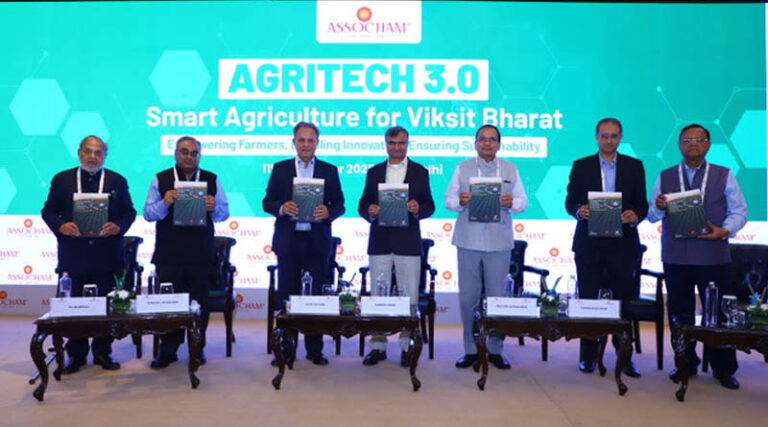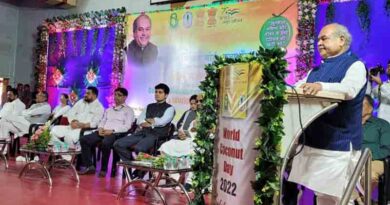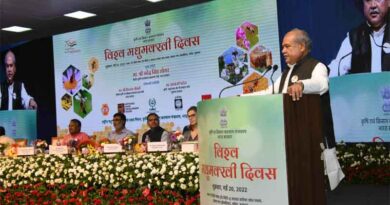
Technology-Led Smart Agriculture Holds the Key to a Developed India: Prof. Ramesh Chand at ASSOCHAM AgriTech 3.0
12 November 2025, New Delhi: ASSOCHAM organised AgriTech 3.0: Smart Agriculture for a Developed India, convening leading policymakers, industry visionaries, and experts to deliberate on how technology, innovation, and data-driven solutions can transform India’s agricultural future.
Delivering the keynote address as Chief Guest, Prof. Ramesh Chand, Member, NITI Aayog said, “Technology-led smart agriculture holds the key to building a developed India. The agri-tech ecosystem is evolving rapidly — from genetic modification and precision farming to data science and ICT-based advisory systems. Farmers must be empowered with access to capital, knowledge, and partnerships that enable them to embrace these transformations. Every technology comes with both opportunities and challenges; therefore, innovation must go hand-in-hand with sustainability and environmental balance. India today is not only food-secure but also advancing towards value addition and climate-smart agriculture.”
He further emphasised, “With 46% of the population engaged in agriculture, the sector is the largest contributor to the mission of a developed India. We are witnessing strong growth emerging from Tier II regions such as Assam and Madhya Pradesh.”
Guest of Honour, Dr. Praveen Kumar Singh, Agriculture Commissioner, Department of Agriculture & Farmers Welfare, Government of India, highlighted the importance of building a sustainable, data-driven ecosystem. He remarked, “Our goal is to make agriculture both productive and sustainable. Platforms like upag.gov.in are integrating data on agri statistics, Fasal Bima, crop yield, and Kisan Credit Cards to facilitate informed decision-making. Initiatives such as converting crop residues into compressed biogas (CBG) and the KUSUM scheme are linking renewable energy with agriculture. Through digital agriculture and real-time data intelligence, we aim to make technology accessible in farmers’ local languages so that every farmer can benefit.”
In his opening remarks, Mr. Sagar Kaushik, President – Global Corporate & Industry Affairs, UPL Limited, welcomed dignitaries and participants, stressing the global responsibility of agriculture in addressing climate change. He stated, “Global events like COP30 and the UN climate agenda remind us that agriculture must be part of the climate solution, not the problem. Farmers are the real heroes — not just food producers but climate protectors. It is time we celebrate their resilience and innovation. Policies must empower them, transforming their image from zero to hero. Consumers, too, must recognise their role in climate protection. With sustainable practices, permaculture, and organic farming, we can truly say: #AFarmerCan.”
Mr. N.K. Aggarwal, Co-Chairman, Agri Inputs and Farming Practices Council, ASSOCHAM, and Chairman, Crystal Crop Protection Limited, underlined the significance of effective technology implementation and policy execution. He said, “Smart farming is the foundation of a developed India. While the government has introduced numerous farmer-centric schemes, strong implementation across central and state levels is vital. AgriStack, which connects 7.5 crore farmers, is a landmark initiative enabling farm-level data integration. The Digital Agriculture Mission, supported by EY, is laying the groundwork for customised farm solutions through geospatial and satellite-based technologies. This transformation will turn small landholdings into viable enterprises, bridging the gap between farmers and consumers through tailored food programs.”
Offering an industry perspective, Dr. R.G. Agarwal, Chairman Emeritus, Dhanuka Agritech Limited, emphasised the role of innovation and regulation in crop protection. He noted, “Earlier, licensing in the pesticide sector ensured quality, but with de-licensing, standards are declining. Pesticides act as a form of ‘Kisan Insurance’. With the rise of exotic pests and climate change, we urgently need new technologies and innovative crop protection products. Research and quality control are essential to safeguarding India’s food security.”
On this occasion, a joint Knowledge Report by ASSOCHAM and EY, titled “The New Agri-Tech Paradigm: From Innovation to Integration for a Future-Ready Agriculture in India”, was unveiled. Click here to download.
Global Agriculture was the official media partner for ASSOCHAM AgriTech 3.0, supporting the event’s vision to advance India’s agricultural transformation through technology, innovation, and sustainability.
Also Read: Maharashtra’s Sweet Lime Farmers Hit by 48°C Heat, Drought, and Unpaid Insurance Claims
📢 If You’re in Agriculture, Make Sure the Right People Hear Your Story.
From product launches to strategic announcements, Global Agriculture offers unmatched visibility across international agri-business markets. Connect with us at pr@global-agriculture.com to explore editorial and advertising opportunities that reach the right audience, worldwide.






